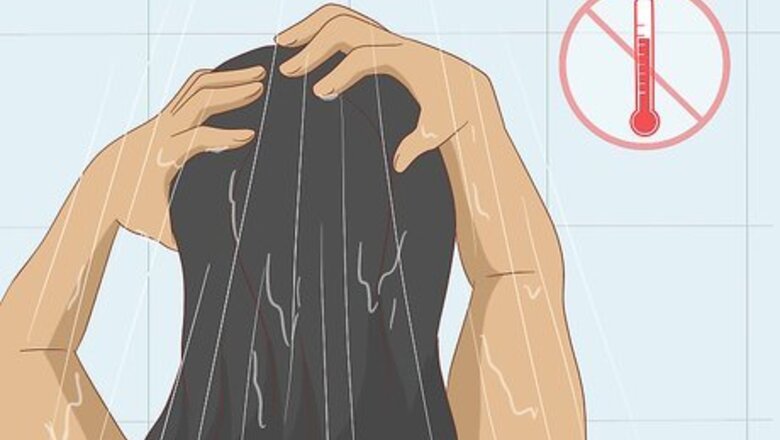
views
X
Trustworthy Source
PubMed Central
Journal archive from the U.S. National Institutes of Health
Go to source
Washing with Hard Water
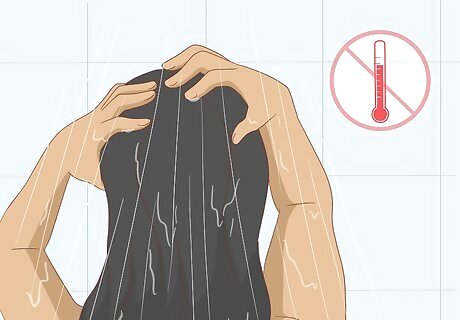
Avoid washing your hair in hot water. Hot water can strip the healthy oils from your hair and scalp, especially if you’re bathing in hard water. Use lukewarm or cool water to wash your hair and minimize the damage from the hard water.
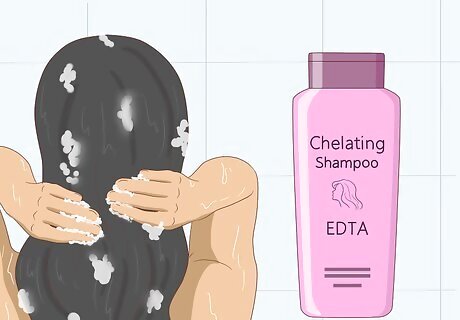
Use a chelating shampoo to wash out mineral buildup. Look for a shampoo with EDTA on the label, which stands for Ethylene Diamine Tetra Acetate, a chemical that rinses away minerals and deposits hard water can leave in your hair. If you notice your hair looking dull or feeling dry, apply the shampoo to your wet hair and rinse it out to clean it and remove the hard water deposits. Check for shampoos labeled as “gentle” or is described as for sensitive or dry hair. A "chelating" or "clarifying" shampoo is a good choice. These shampoos are designed to tackle and prevent mineral build-up in your hair, but they are harsh so should be used sparingly.
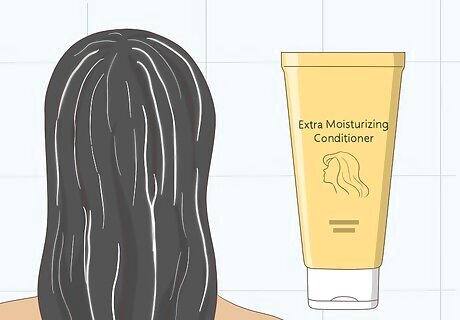
Apply conditioner to your hair and scalp to re-hydrate them. Rinse the shampoo out of your hair and spread conditioner to help hydrate and moisturize your hair. Work the shampoo from the roots to the tips of your hair and massage it into your scalp to moisturize your skin as well. Allow the conditioner to sit in your hair for the recommended time on the bottle. Look for an extra moisturizing conditioner to use. It's always a good idea to use a conditioner after you wash your hair in hard water. This will help to prevent your hair from drying out and becoming brittle, which can contribute to hair loss.
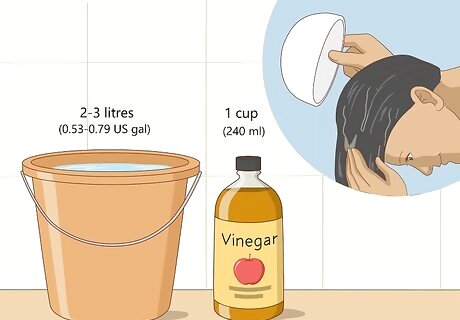
Rinse out the conditioner with a mixture of apple cider vinegar and water. Combine 1 cup (240 mL) of apple cider vinegar with 2–3 litres (0.53–0.79 US gal) of water in a bucket or bowl. Use the solution to rinse out the conditioner and hard water from your hair. The vinegar balances the pH of your hard water and removes any deposits that can dry out or damage your hair.
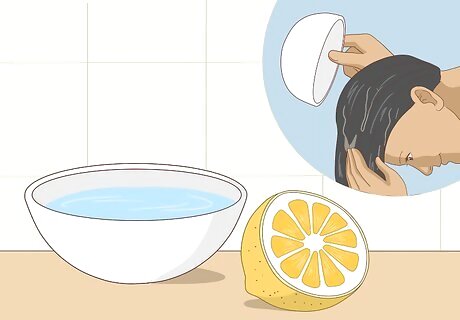
Use a lemon rinse as an alternative. Add a few drops of lemon juice to a cup or bowl of water to make it acidic enough to breakdown layers of buildup on your hair. Rinse your hair with the lemon water after you wash it to flush out any minerals from the hard water.
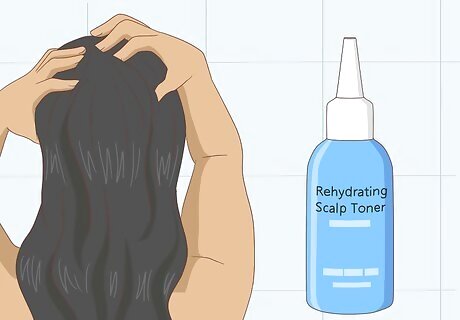
Apply a daily scalp toner to hydrate and soothe the skin. Use a rehydrating scalp toner and spread it directly onto your scalp. Work the solution into your skin with your fingertips to moisturize your scalp and keep your hair healthy. Scalp toner is a great way to finish your shower routine and repair any damage caused by the hard water. Look for a daily scalp toner you can use every time you wash your hair.
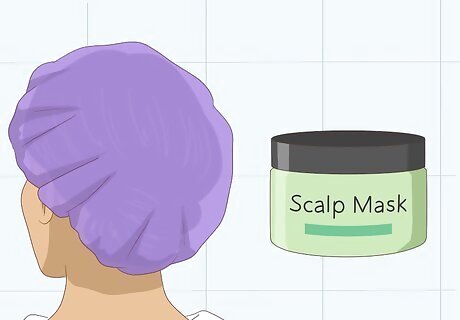
Do a weekly scalp mask treatment to remove mineral traces. A scalp mask is a specially formulated hair product that soothes your stressed out scalp and rehydrates your hair and skin. Once a week, apply a scalp mask and leave it on for as long as the packaging recommends. Then, rinse your hair to help remove minerals from your hard water. Look for scalp masks at your local beauty supply shop or hair salon. You can also order them online.
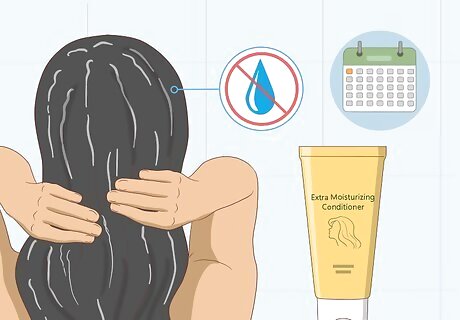
Put conditioner in your dry hair once a month to condition and protect it. Apply your conditioner to your hair before you wash it about once a month to smooth and protect it from the minerals in the hard water. Take a shower or bath after you apply the conditioner like you normally would. Be sure to work the conditioner into your scalp as well.
Softening the Water
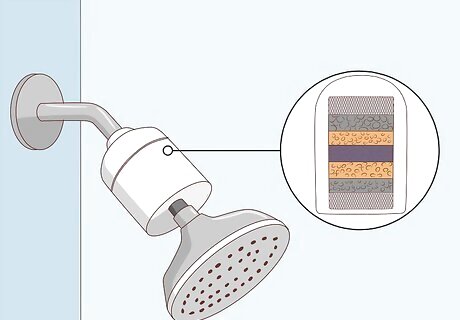
Attach a shower-head water filter to reduce the effects of the hard water. Choose a shower-head filter designed to remove impurities and deposits from hard water. Go with an activated carbon filter, which is the most effective option for removing contaminants from your hard water. Fasten it to your shower with the connectors included in the packaging. Make sure the filter is firmly attached so there aren’t any leaks. You can find shower-head water filters at your local home improvement store or hardware store. You can also order them online. Make sure you change the filter as often as it’s recommended on the packaging so it stays effective.
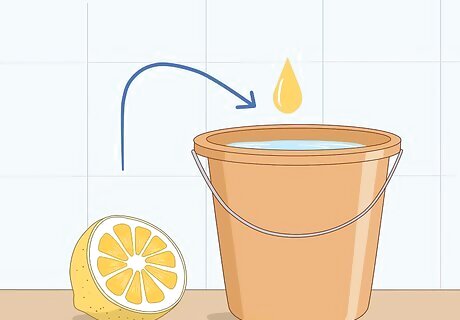
Squeeze a lemon into a bowl of water to soften it. Fill a bowl or a bucket with the hard water and squeeze the juice of a lemon into it to neutralize the water. Wash your hair with the softened water as you normally would and you won’t have the damaging effects of hard water. The acid in the lemon changes the pH of the hard water, which can help prevent it from stripping moisture and natural oils from your hair and scalp.
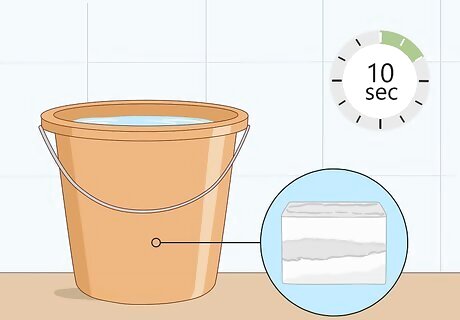
Purify a bowl of water with an alum block for an alternative solution. Aluminum sulfate, also known as alum, is a chemical used to purify water. Fill a bowl or bucket with hard water and place an alum block in the water for 10 seconds. Remove the alum block from the water and wait 1 minute until the water clears. Then, wash your hair with the purified water. Look for alum blocks at your local department store or pharmacy. You can also order them online.
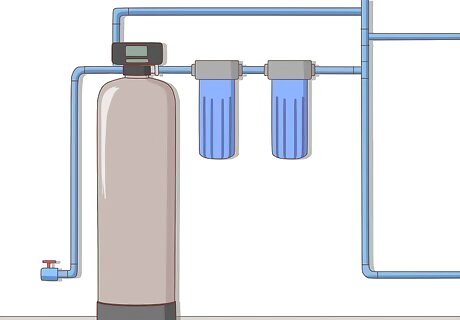
Install a whole-home water softener for the surest option. If you want to completely soften your hard water, choose a water softener that will filter your entire home’s water supply. Have a professional install the softener so it’s done correctly and according to local building codes. A water softener for your entire home is the most expensive option, but it’s the best way to make sure your water doesn’t damage your hair. Whole-home systems usually cost at least $1,000 USD.













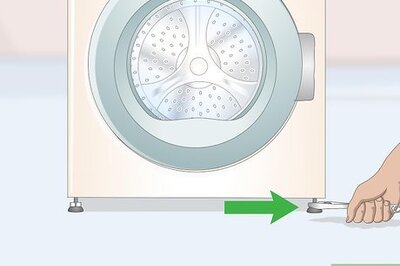




Comments
0 comment